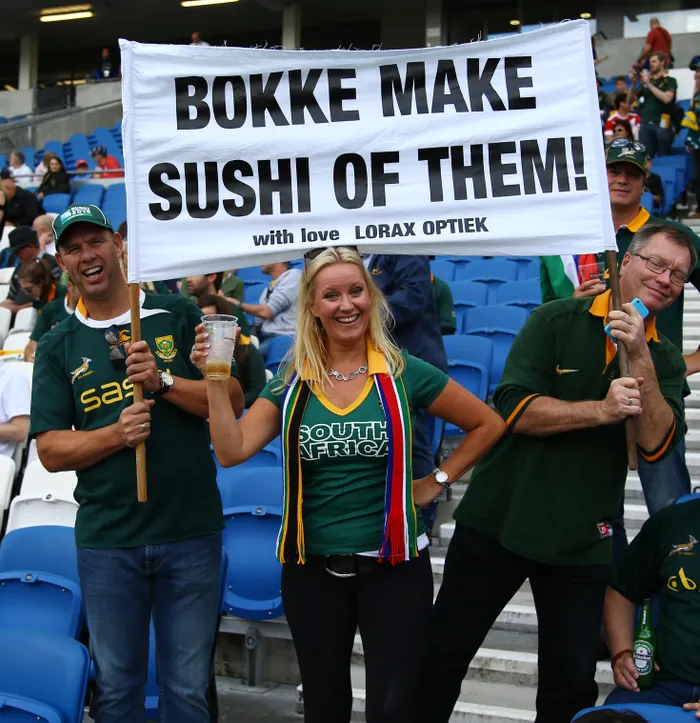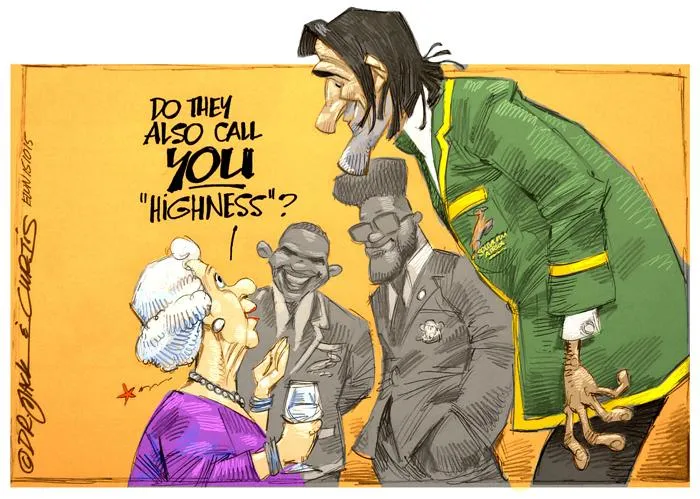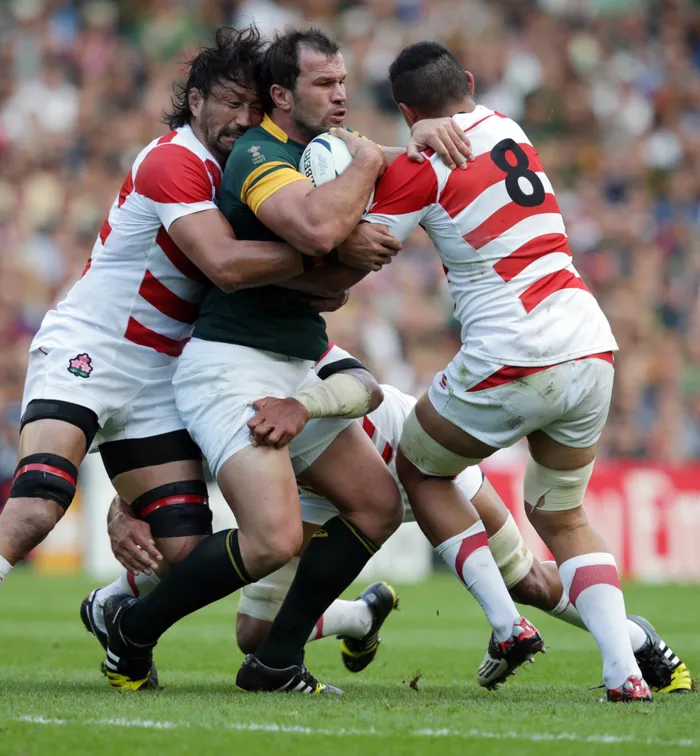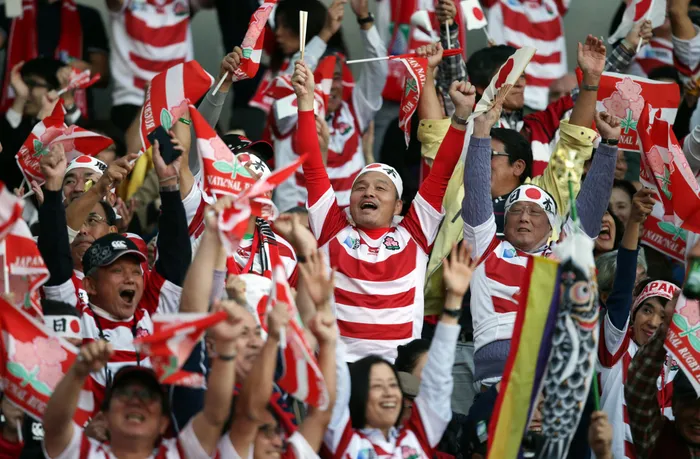If we lose to Japan, we'll jump off a cliff - Jean de Villiers' fatal words before kickoff in Brighton
RUGBY

Bok fans were confident before the game, but the Boks could not make sushi of the Japanese.
Image: Supplied
The ancient Greeks invented the word hubris to describe how excessive pride and conceited confidence often precede a mighty fall.
Looking back on it now, ten years since the most traumatic event in Springbok history, hubris hung heavy over the Springboks’ preparations for their 2015 World Cup opener against Japan at the Brighton Community Stadium.
The Boks were based in the seaside town of Eastbourne, and the week had begun with Jean de Villiers bringing the house down at the Boks’ welcoming ceremony in a Victorian theatre on the promenade.
After a series of crusty speeches by the dignitaries, the captain took the mic and gave an uproarious speech that had nearly a thousand supporters rolling in the aisles.
"Mrs Mayor," he said, abandoning all formalities, “You say this theatre was opened in 1870. Victor Matfield (at 37, the oldest player in the Bok squad) remembers it well and is pleased to report that it is as he remembers it.”

"Queen and Matfield": The Springboks met the Queen during the week before they played Japan. Queen Elizabeth was shocked at the height of Victor Matfield. | Supplied
Image: Supplied
Several witty quips later, De Villiers closed with this temptation of fate: "Mrs Mayor, you say that a local attraction is Beachy Head, the highest chalk cliff in England? I hear it is also a popular suicide spot. Well, if we don't win this match, there will be 31 green and gold lemmings jumping off that cliff....”
Just six days later, a semblance of De Villiers sat at the post-match press conference… It was as if he had, in fact, jumped, and it was his ghost reporting for haunted duty.
Gaunt and pale with shock, he could barely speak. All he could muster in a strained voice was: “I am at a loss for words..."
A broken man, he was a far cry from the raconteur of earlier in the week.

Bismarck v Japan: Not even the mighty Bismarck du Plessis could get the best of Japan. It was their day.
Image: Supplied
Next to him was Heyneke Meyer, wide-eyed with the terror of a man who had just witnessed his family’s execution. “Sorry, we’re sorry. We apologise to the nation,” the crestfallen coach muttered.
Maybe it was the nine days of boredom in the tranquil south-east of England that was the Boks’ undoing. The mayor had proudly pointed out that Eastbourne has, on average, more days of sunshine than any other English town, and indeed it was mostly blue skies that week. The weather is also why it is the geriatric capital of England — Eastbourne is where many Poms come to retire and is nicknamed God's Waiting Room.
Little wonder that the Bok players variously described themselves as "coiled up springs, volcanoes waiting to erupt and sprinters in starting blocks”... only to play with the zest of the old dears with purple-tinted hair pushing their Zimmer frames along the promenade.
On the other side of the fence that week was artful Eddie Jones, who had been plotting the downfall of the Boks for two years.
He had been so intense in the Japanese preparations that some of his players later admitted they were thrilled to see the back of him — Jones’ coaching shares shot through the roof thanks to this win. He was able to write his own cheque for the England job, which became vacant when the host nation failed to make the playoffs.

Eddie Jones Japan: Japan coach Eddie Jones had plotted the Boks' downfall for two years. He got it spot on.
Image: Supplied
All week, wily Eddie had waxed on about how difficult it would be to compete against the mighty Springboks, but he said this: “If we get some early points, watch how nervy the Boks get...” and boy was he spot on.
The Brave Blossoms got braver by the minute as they went about chopping the Boks down at the ankles and traversing play from one touchline to the other at a furious pace aimed at tiring their heavier foes.
And the neutrals in the 30,000 crowd, not to mention a good sprinkling of Japanese fans, exploded into life as it became increasingly apparent that David could well slay Goliath.
For observers around the world, it was a cracking game of rugby, pure entertainment with a result scripted by the rugby gods. Each time the Boks seemed to be getting ahead, the Japanese would fight back.
Every time the Boks looked like they had found a catalyst to get their game going with a try from the forwards, the Japs bounced back with a flurry of penalty goals by fullback Goromaru.

Japan fans celebrate: The Japanese fans had their day in the sun at the Brighton football stadium.
Image: Supplied
In the dying minutes, they could have taken an easy penalty goal to draw the game at 32-32, but chose a scrum from which they scored a famous try that caused a seismic reverberation across the rugby world.
How could this happen? Simple. The No 13-ranked team in the world that day taught the Boks a lesson in passion, enterprise, and courage. The Boks, by contrast, were sadly insipid.
Lood de Jager, the best South African player that day, summed it up: “If we are honest with ourselves, Japan should have won by more. They were as good as we were bad. They lifted their game by 50 percent, and we went down by the same percentage.”
It was a much-chastened squad that on the Sunday travelled by bus to the Midlands city of Birmingham. There were six hours on a bus to fully digest the previous day’s crime against the green and gold jersey.
Apparently, barely a word was spoken on the eerily quiet journey. The bus was a travelling morgue as each player and coach did their private post-mortem.
After a week of intense introspection, the Boks smashed Samoa and ultimately would finish that World Cup with the bronze medal.
But the day they were put to the sword by Jones’ Samurais will never be forgotten, and whenever a Springbok coach senses complacency in the ranks, he will raise this cry: “Remember Japan!”
This story is an extract from Mike Greenaway’s best-selling book, The Fireside Springbok. He has also penned Bok to Bok, a colourful recollection of the Springboks’ 2023 World Cup triumph.